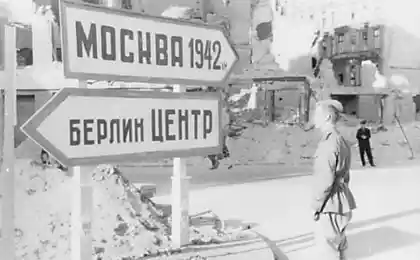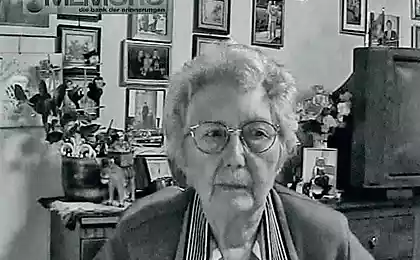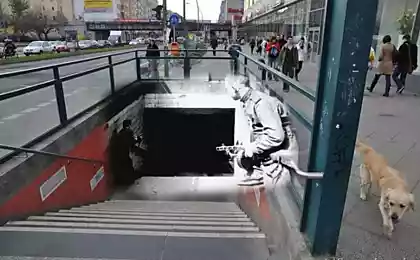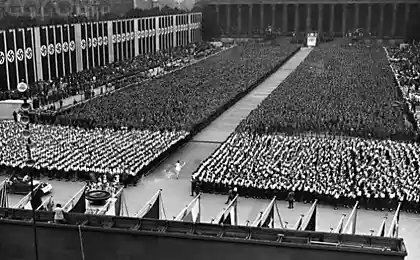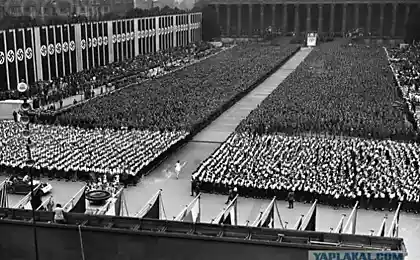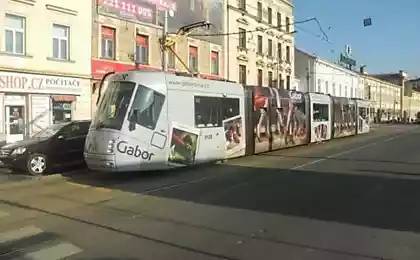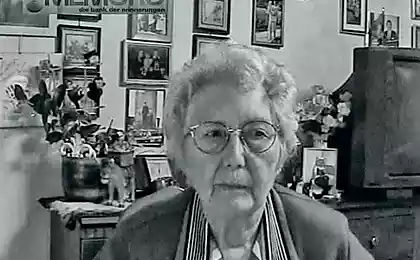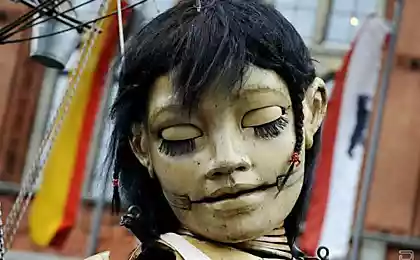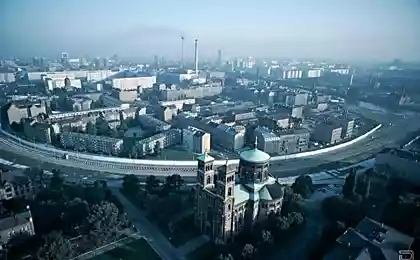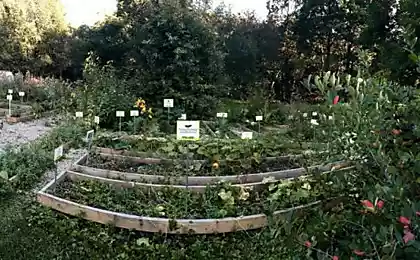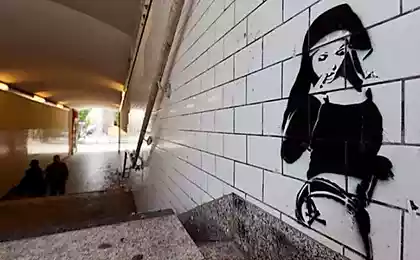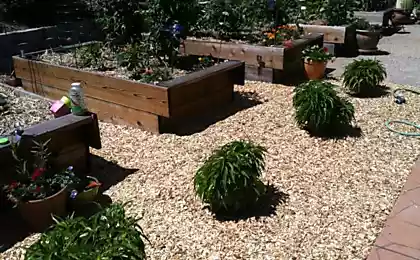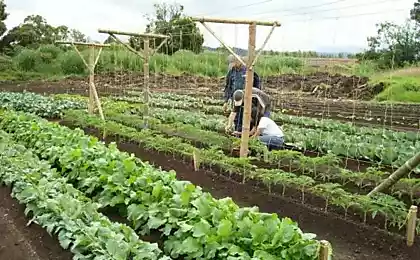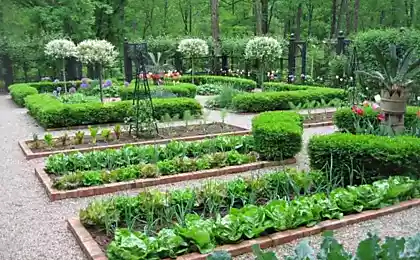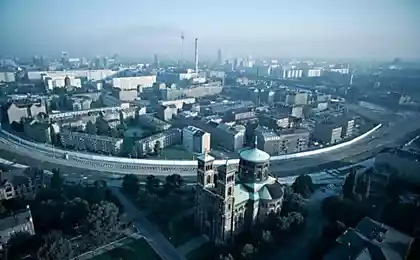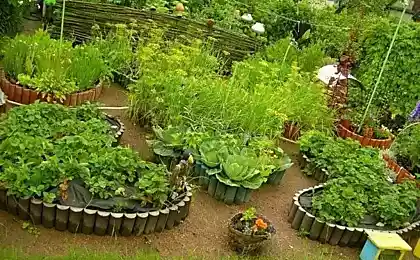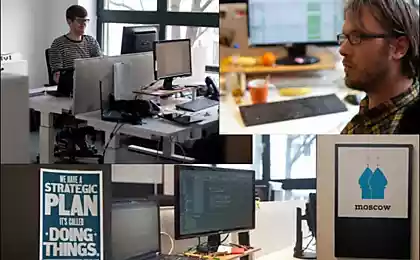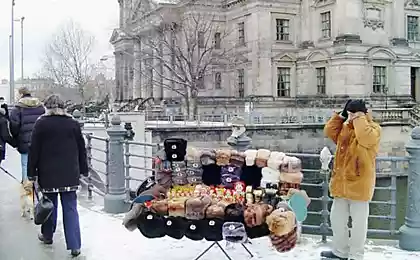409
Prinzessengarten— public garden in Berlin
Resourceful people rent in Berlin a large vacant lot and turned it into an urban farm called Prinzessengarten. This is a public garden in which the activists to attract people to horticulture and agriculture.
Residents of cities can hardly imagine how many resources you need to feed them. You remember, looks like a Bush on which grows a quince? I know that there are five thousand varieties of potatoes? And your children believe that it is blue? We are very detached from the earth and nature, so little idea how food gets on our tables.
To solve this problem began in Berlin: young people popularitybut urban gardening and smash on any available part of the public gardens, where they can work and learn anyone.
Search podagricescoy urban gardening developed in Cuba: local public gardens do provide products of the small city. "Princesses Gardens" another function is to inculcate the citizen understanding of who produces the food.
Our project is public, so we were looking for a place that will be convenient to arrive from different parts of the city. In the centre of Berlin, a lot of vacant lots, most of which are littered with debris. Unfortunately, the owners of the land to which we referred, though, and was interested in the social project, but the lease provided no more than a year. To develop the garden with an Outlook for the year and economically inefficient, and difficult from the point of view of planning.
The land on which we work now belongs to the city. The contract for rent, we also concluded for the year, but there are some guarantees that our cooperation will be long-term. In 2013 we managed to collect 35 thousand signatures to petition for preservation of the territory at our garden until 2018. What will happen then, don't know yet, but at least we started planting perennials.
Device public ogorodami not planting directly in the ground, and use the boxes. For a variety of reasons. First, we are concerned about contamination of soil in the center of the city. Second, we need to stay mobile. Thirdly, we believe that it is practical. Everyone who works in the private garden or yard, know how to handle uncomfortable beds vnakladku. In the case of boxes the height can be adjusted.
We reuse things, so take the old boxes, but only those that were previously intended for the food — the old bakery stand, canisters for flour. In the bottom drawer are always chopped the branches and compost. At the top of the plant. Despite the fact that the soil is quite poor, compost supplies nutrients to the top, and the plants almost never need to fertilize.
Special mention deserves the irrigation system. To go with the impractical watering: water immediately goes down. We are collecting water in cans, and after the hoses are routed to the crates. In hoses above each bed there are holes that you can twist to adjust the pressure. Despite the fact that such irrigation requires three to six hours, the earth remains wet for three days. Unfortunately, we still use water from water supply systems, not rain, but would like to go to her collection.
All the compost that you need for the garden, we produce ourselves. First, we did not succeed, but then came the restaurant, which has a lot of waste. Here we bring garden waste from our projects around the city. We are able to move your compost heap from place to place three or four times a year. It saturates it with oxygen. Living there worms and microorganisms bring the inside temperature up to 40-45 degrees Celsius.
Potatoes grown right in the bags. This method a lot of advantages: plants are not up, you can just shake the bag and pour it in the ground. So we many times increase the productivity.
In total there are about 5000 varieties of potatoes. In the Gardens of the princesses ' grows only 15, but that for many children is a revelation. In the supermarket presents two or three varieties, which are selected according to criteria such as storage life and appearance. The taste sometimes becomes secondary. We have blue potatoes. Children who grew up on food from the supermarket, saying that it's not potatoes. They have a lot to explain, to prove, to cook it in front of them.
Something we grow on the perimeter, for example, shrubs, food plants, which are used for dyeing. You can see what the plants do the blue paint, some yellow, to participate in the free workshops — we have the opportunity offset printing on fabric. It was the idea of a woman who just came to see what we're doing here.
House for ascomycete sit on the bench and a few moments to observe the weird drawer full of different textured trees, herbs and shrubs, it is possible to see several dozen species of insects. Bees, ladybugs, numerous bugs, insects with wings and without wings. This meets one of our main principles — we want to give animals and insects a place to live in the city. Sometimes in the beds of rabbits running, and once we saw in the garden a Fox.
"Prinzessinnenbad" founded in 2009, then settled here and bees. Now there are nine hives. The beekeeper — a separate office in the Gardens of the princesses". As strange as it sounds, bees in the city now live better than the city. There are widely used pesticides, grown in monoculture, and this greatly affects their health. They lose the ability to focus because of the monotonous food, they have reduced immunity.
Staff and posetitelyami garden is closed, there is office work and planning. In the cold months here working from 8 to 15 people. They all get paid. Summer salary get 25 people plus a few interns and guys who are voluntary environmental service (for example, conduct tours of the garden) — about a hundred per year.
Thursday and Saturday we have open days — a time when anyone can work in the garden. Someone comes because he wants to Tinker with the earth, and the garden had not, someone wants to talk, someone who has a wealth of experience and wants to share it. Twice a week we hold open meetings to the public. On Tuesdays you can discuss what to plant on Friday — to talk about third-party projects and ideas.
Garden belongs to no one and at the same time belongs to everyone. If residents have good ideas, they come to the garden and try to implement them on any free space. One time we were given to plant medicinal herbs and it is now one of the most important areas in the garden. We tell you what medicinal plants help in diseases of the how to prepare balms, cosmetics. At the rear of the garden are holding lessons on how to make pasta and bread baking with herbs.
Our main task is to ensure that the citizens ' attitude to food has changed. Children come here from schools, whole classes. And some people say, "Oh, it turns out, the spinach, and I don't know. I was thinking that spinach is a green cube, which we took out of the freezer". It's a sad story. It is important that people understand that food comes to our table not from the supermarket. That food production is associated with a lot of work. That the harvest depends on many factors.
Finansirovaniya legal form — public limited liability company. We are a company that has the right to make a profit, but all of it should go to useful projects and garden maintenance. We have classes for children and young people, paid and free. We conduct paid tours for groups, collect donations, help in the development of gardens, a variety of organizations such as kindergartens and schools. Always adapt to the budget, we have no standard rates. Of course, if you have an advertising Agency that wants an elegant garden, we take a lot more money. Our work can be seen all over Berlin.
At the far end of the garden there is a restaurant and bar, the proceeds of which go to cover our expenses. In the summer we sell to three hundred meals per day, it is a good financial help. Vegetables from the garden, too fall into the restaurants, but the minimum quantity to meet the needs of even a small catering with the help of this garden impossible. Basically they are our flowers and herbs.
People who help us to raise vegetables, you can very cheap to buy that matured in this period. They also receive a 50% discount on the products bar and restaurant. We have a Board where we write what and in what period you can buy. For a nominal fee rip it myself straight from the garden. We can buy books and seeds. This trade gives us 2% of the total income.
The bike shop and secondary ispolzovaniem we have two third — party project is velocitynet and workshop where they make things from b/y materials. Anyone can come here with his bike for help. He will show how to construct the basic mechanisms, in order to repair yourself.
What once was, we use secondary. We have a barn that is 98% constructed from recycled materials. This initiative is called "Financial mafia". Two girls go to Berlin and collect materials that remain after the Berlinale, festivals, exhibitions. Usually it's the expensive things that were used only once. They are all stored here and processed — in the garden, hanging their hammocks from Cycling chambers, are stools. This initiative inspired and representatives of the garden to make more use of old things. They reduce the budget and prove how much you can find the application if to show imagination.
Source: rodovid.me
Residents of cities can hardly imagine how many resources you need to feed them. You remember, looks like a Bush on which grows a quince? I know that there are five thousand varieties of potatoes? And your children believe that it is blue? We are very detached from the earth and nature, so little idea how food gets on our tables.
To solve this problem began in Berlin: young people popularitybut urban gardening and smash on any available part of the public gardens, where they can work and learn anyone.
Search podagricescoy urban gardening developed in Cuba: local public gardens do provide products of the small city. "Princesses Gardens" another function is to inculcate the citizen understanding of who produces the food.
Our project is public, so we were looking for a place that will be convenient to arrive from different parts of the city. In the centre of Berlin, a lot of vacant lots, most of which are littered with debris. Unfortunately, the owners of the land to which we referred, though, and was interested in the social project, but the lease provided no more than a year. To develop the garden with an Outlook for the year and economically inefficient, and difficult from the point of view of planning.
The land on which we work now belongs to the city. The contract for rent, we also concluded for the year, but there are some guarantees that our cooperation will be long-term. In 2013 we managed to collect 35 thousand signatures to petition for preservation of the territory at our garden until 2018. What will happen then, don't know yet, but at least we started planting perennials.
Device public ogorodami not planting directly in the ground, and use the boxes. For a variety of reasons. First, we are concerned about contamination of soil in the center of the city. Second, we need to stay mobile. Thirdly, we believe that it is practical. Everyone who works in the private garden or yard, know how to handle uncomfortable beds vnakladku. In the case of boxes the height can be adjusted.
We reuse things, so take the old boxes, but only those that were previously intended for the food — the old bakery stand, canisters for flour. In the bottom drawer are always chopped the branches and compost. At the top of the plant. Despite the fact that the soil is quite poor, compost supplies nutrients to the top, and the plants almost never need to fertilize.
Special mention deserves the irrigation system. To go with the impractical watering: water immediately goes down. We are collecting water in cans, and after the hoses are routed to the crates. In hoses above each bed there are holes that you can twist to adjust the pressure. Despite the fact that such irrigation requires three to six hours, the earth remains wet for three days. Unfortunately, we still use water from water supply systems, not rain, but would like to go to her collection.
All the compost that you need for the garden, we produce ourselves. First, we did not succeed, but then came the restaurant, which has a lot of waste. Here we bring garden waste from our projects around the city. We are able to move your compost heap from place to place three or four times a year. It saturates it with oxygen. Living there worms and microorganisms bring the inside temperature up to 40-45 degrees Celsius.
Potatoes grown right in the bags. This method a lot of advantages: plants are not up, you can just shake the bag and pour it in the ground. So we many times increase the productivity.
In total there are about 5000 varieties of potatoes. In the Gardens of the princesses ' grows only 15, but that for many children is a revelation. In the supermarket presents two or three varieties, which are selected according to criteria such as storage life and appearance. The taste sometimes becomes secondary. We have blue potatoes. Children who grew up on food from the supermarket, saying that it's not potatoes. They have a lot to explain, to prove, to cook it in front of them.
Something we grow on the perimeter, for example, shrubs, food plants, which are used for dyeing. You can see what the plants do the blue paint, some yellow, to participate in the free workshops — we have the opportunity offset printing on fabric. It was the idea of a woman who just came to see what we're doing here.
House for ascomycete sit on the bench and a few moments to observe the weird drawer full of different textured trees, herbs and shrubs, it is possible to see several dozen species of insects. Bees, ladybugs, numerous bugs, insects with wings and without wings. This meets one of our main principles — we want to give animals and insects a place to live in the city. Sometimes in the beds of rabbits running, and once we saw in the garden a Fox.
"Prinzessinnenbad" founded in 2009, then settled here and bees. Now there are nine hives. The beekeeper — a separate office in the Gardens of the princesses". As strange as it sounds, bees in the city now live better than the city. There are widely used pesticides, grown in monoculture, and this greatly affects their health. They lose the ability to focus because of the monotonous food, they have reduced immunity.
Staff and posetitelyami garden is closed, there is office work and planning. In the cold months here working from 8 to 15 people. They all get paid. Summer salary get 25 people plus a few interns and guys who are voluntary environmental service (for example, conduct tours of the garden) — about a hundred per year.
Thursday and Saturday we have open days — a time when anyone can work in the garden. Someone comes because he wants to Tinker with the earth, and the garden had not, someone wants to talk, someone who has a wealth of experience and wants to share it. Twice a week we hold open meetings to the public. On Tuesdays you can discuss what to plant on Friday — to talk about third-party projects and ideas.
Garden belongs to no one and at the same time belongs to everyone. If residents have good ideas, they come to the garden and try to implement them on any free space. One time we were given to plant medicinal herbs and it is now one of the most important areas in the garden. We tell you what medicinal plants help in diseases of the how to prepare balms, cosmetics. At the rear of the garden are holding lessons on how to make pasta and bread baking with herbs.
Our main task is to ensure that the citizens ' attitude to food has changed. Children come here from schools, whole classes. And some people say, "Oh, it turns out, the spinach, and I don't know. I was thinking that spinach is a green cube, which we took out of the freezer". It's a sad story. It is important that people understand that food comes to our table not from the supermarket. That food production is associated with a lot of work. That the harvest depends on many factors.
Finansirovaniya legal form — public limited liability company. We are a company that has the right to make a profit, but all of it should go to useful projects and garden maintenance. We have classes for children and young people, paid and free. We conduct paid tours for groups, collect donations, help in the development of gardens, a variety of organizations such as kindergartens and schools. Always adapt to the budget, we have no standard rates. Of course, if you have an advertising Agency that wants an elegant garden, we take a lot more money. Our work can be seen all over Berlin.
At the far end of the garden there is a restaurant and bar, the proceeds of which go to cover our expenses. In the summer we sell to three hundred meals per day, it is a good financial help. Vegetables from the garden, too fall into the restaurants, but the minimum quantity to meet the needs of even a small catering with the help of this garden impossible. Basically they are our flowers and herbs.
People who help us to raise vegetables, you can very cheap to buy that matured in this period. They also receive a 50% discount on the products bar and restaurant. We have a Board where we write what and in what period you can buy. For a nominal fee rip it myself straight from the garden. We can buy books and seeds. This trade gives us 2% of the total income.
The bike shop and secondary ispolzovaniem we have two third — party project is velocitynet and workshop where they make things from b/y materials. Anyone can come here with his bike for help. He will show how to construct the basic mechanisms, in order to repair yourself.
What once was, we use secondary. We have a barn that is 98% constructed from recycled materials. This initiative is called "Financial mafia". Two girls go to Berlin and collect materials that remain after the Berlinale, festivals, exhibitions. Usually it's the expensive things that were used only once. They are all stored here and processed — in the garden, hanging their hammocks from Cycling chambers, are stools. This initiative inspired and representatives of the garden to make more use of old things. They reduce the budget and prove how much you can find the application if to show imagination.
Source: rodovid.me

